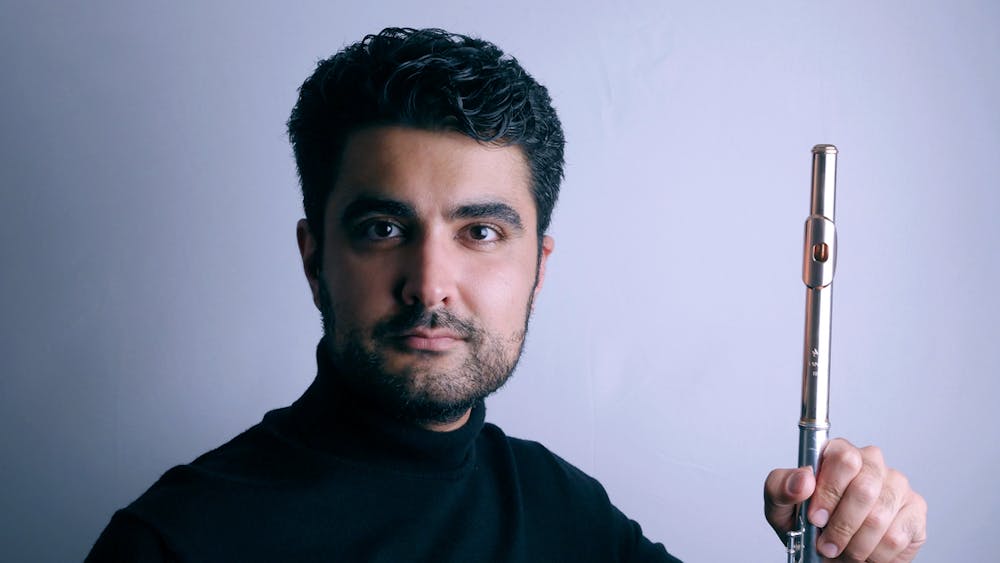Editors Note: This article has been updated since publication to include accurate information regarding the source of a grant.
Mehrdad Gholami, a flutist and assistant professor at Western Washington University, received a $1,500 grant in October from Artist Trust. With the grant, Gholami bought equipment that will improve the sound quality of his recordings in anticipation of his upcoming album.
The album, which Gholami has given the working title of “Caspian Sea Project,” will feature songs by contemporary composers from countries surrounding the Caspian Sea. He aims to release the album in summer 2025.
Gholami, who’s from Iran and received his undergraduate at the University of Tehran, has recorded several albums featuring the works of Iranian composers. Recently he discovered the prospect of highlighting countries near Iran.
“I realized that the Caspian Sea region is so rich with music, ideas, composers [and] cultural contributions,” Gholami said. “That's become my interest.”
Gholami has spent the last couple of years selecting the songs he wants to be on the album. Sometimes they fall into his lap, like when his friend, composer Neda Samavati, sent Gholami a song she composed and dedicated to him. Other times, he has to do some searching.
When researching songs for the album, Gholami became interested in a 1981 Sonata for Flute and Piano by Jeren Kurbanklycheva, who Gholami said is Turkmenistan’s first woman composer.
Turkmenistan’s music is not as well-documented as that of countries like Iran and Armenia, so Kurbanklycheva’s piece wasn’t online, said Gholami. He reached out to Kurbanklycheva’s daughter via Facebook. Weeks later, the family sent Gholami a digital copy of the manuscript.
Gholami “believes in good music.” He’ll stumble on songs that have high historic value, but the music itself doesn’t grab his attention. This time, though, the piece was historically significant and a great song.
“It was like a little fairy tale,” Gholami said. “[There are] moments that you get lucky – that it's a very important piece in the canon of music from this region, and then also it’s a good piece. That's a bingo. That's a jackpot.”
Gholami has arranged the album’s songs for flute and piano, flute and guitar or solo flute. Many of the songs were originally composed for a different instrumentation.
Gholami was one of 65 recipients of the Artist Trust’s 2024 Grants for Artist Projects.
Artist Trust is a nonprofit organization based in Seattle that serves writers, performing artists, musicians, filmmakers and visual artists from Washington state, said program director Lydia Boss. Through grants, Artist Trust helps artists fund projects, upgrade equipment and further their careers.
A panel of five artists reviews the applications for the grant and selects a balanced pool of artists in different mediums. Gholami stood out because of his ambition and dedication to the “Caspian Sea Project,” Boss said.
“We're really excited to be able to support Mehrdad,” Boss said. “I think that the work he's pursuing is really important and we're thrilled to be able to support it.”
Gholami came to Western in fall 2023. In one year, he’s played a role in broadening the cultural scope of instruction in Western’s music department, said Tim Fitzpatrick, chair of Western’s music department.
“A lot of what we do in higher education is still firmly rooted in what you could call western-classical music,” Fitzpatrick said. “He developed his skill as a flutist, probably studying largely Western-classical music. But that's not where his innovation is – it’s cross-cultural.”
Gholami has helped grow the flute area of Western’s music department, Fitzpatrick said. By recording albums like the “Caspian Sea Project,” he brings attention to the music department, translating to more student interest in the department’s programs.
“Faculty regard him as organized and innovative. The students love him,” Fitzpatrick said. “He’s recording another album and that helps put us on the map.”
Boss highlighted Gholami’s commitment to playing music from regions that are often underrepresented as another reason why Gholami received a grant from Grants for Artist Projects.
“His work is focused on preserving cultural traditions in a region that is historically underrepresented for composers and musicians,” Boss said. “Preservation of that work is really important.”
Gholami acknowledges that representation is important, but that’s not what draws him to projects like the Caspian Sea album. He argues that to get people interested in a certain region's music, he just needs to play what sounds good.
“I can go and get all philosophical about it, but it sounds good. It’s close to what I grew up with. It’s a gold mine of untapped resources,” Gholami said. “It’s good music.”
Milo Whitman (he/him) is a campus news reporter for The Front this quarter. He is a news/ed journalism major and a film studies minor. You can reach him at milowhitman.thefront@gmail.com.






